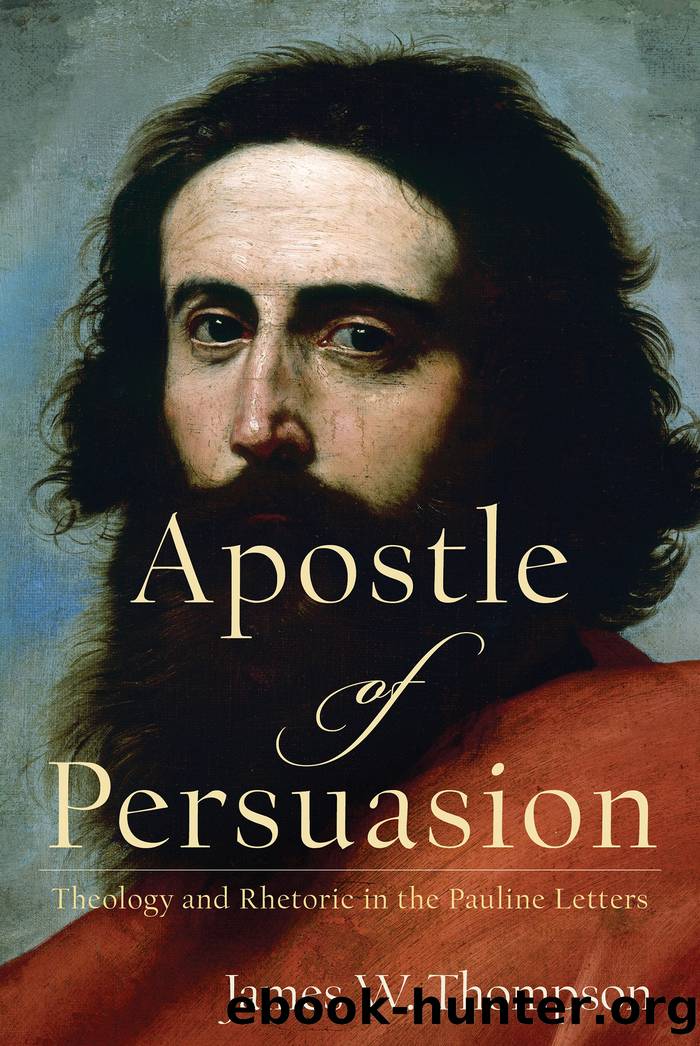Apostle of Persuasion by Thompson James W.;

Author:Thompson, James W.;
Language: eng
Format: epub
Tags: Paul/New Testament;Bible (Epistles of Paul—Theology);REL006720;REL006100
ISBN: 9781493423613
Publisher: Baker Publishing Group
Published: 2020-03-19T00:00:00+00:00
Rhetoric and the Theology of the Cross in 2 Corinthians
The Rhetorical Situation
Although a year passes between 1 and 2 Corinthians (2 Cor. 8:10), many of the same issues remain. Paul offers frequent statements of his credentials in the form of catalogs of sufferings (2 Cor. 4:7â10; 6:4â10; 11:23â33; 12:10) because the opponents have forced him into competitive boasting (2 Cor. 10:12; 11:18, 22â23; 12:11).32 Rival apostles probably joined with those who questioned Paulâs authority in 1 Corinthians, bringing letters of recommendation (2 Cor. 3:1), boasting of their credentials (cf. 2 Cor. 5:12; 11:18), and comparing themselves with Paul (2 Cor. 10:12â18). The criticisms that âhis bodily presence is weak and his speech is of no accountâ (2 Cor. 10:10 AT) and that he is unskilled in speaking (2 Cor. 11:6) indicate that the issues of 1 Corinthians 1â4 are still present. Paulâs refusal of patronage and his manual labor (cf. 4:9â11; 9:1â3) also continue to be an issue (2 Cor. 11:7â11, 20; 12:14â18; cf. 2:17). He defends himself against the opponentsâ charges, that he conducted himself âwith worldly wisdomâ (en sophia sarkikÄ, 2 Cor. 1:12) and that he made his decisions âin a worldly wayâ (kata sarka, 2 Cor. 1:17; cf. 10:2), turning those charges against them. He insists that, since his conversion, he no longer regards anyone âin a worldly wayâ (kata sarka), although he once regarded Christ in this way (2 Cor. 5:16). Now, however, living in the new creation, he has a new way of knowing (2 Cor. 5:17). It is the opposition that boasts âin a worldly wayâ (2 Cor. 11:18)âthat is, according to the standards of the old aeon.
The standards of the old aeon are those that conformed to the values of Greco-Roman culture. The charge that Paul is humble (tapeinos, 2 Cor. 10:1) and that he has humiliated (cf. tapeinÅn) himself by working with his hands (2 Cor. 11:7) reflects the negative Greco-Roman attitudes toward humility and manual labor.33 The accusation that âhis bodily presence is weakâ also reflects Greco-Roman values regarding physical beauty and strength.34 Thus Paulâs challenge in both Corinthian letters is to inculcate values that correspond to the new aeon.
Invention and Arrangement
Second Corinthians, unlike the other Pauline letters, contains little ethical advice regarding future conduct, for it is a defense speech in which Paulâs argument consistently appeals to ethos and pathos. As a defense speech about Paulâs past conduct, it approximates judicial rhetoric.35 Although the letter is frequently regarded as a compilation of separate letters, a singular thread indicates that the same rhetorical situation and theme lie behind all parts of the letter. Consequently, one may observe the invention and arrangement of a unified letter.
In the exordium (1:3â7), Paul introduces the topic that is under dispute without indicating that it is the subject of controversy. Having been criticized for his weakness (10:10; cf. 11:21, 29â30; 12:10; 13:3â4), he echoes the psalmist (cf. Pss. 116:1â11; 118:5; 119:50) in praising the God who âcomforts us in all our afflictionsâ (thlipseis, 2 Cor. 1:4), the pervasive theme in 2 Corinthians (2:4; 4:17; 6:4; 7:4).
Download
This site does not store any files on its server. We only index and link to content provided by other sites. Please contact the content providers to delete copyright contents if any and email us, we'll remove relevant links or contents immediately.
The Switch by Beth O'Leary(1077)
Sisters by Daisy Johnson(1071)
Guard Duty by Sharon Dunn(859)
The Enemy by Sarah Adams(858)
Explosive Situation by Terri Reed(738)
The Christmas Killer by Alex Pine(736)
Alaskan Showdown by Sarah Varland(730)
The Ruthless Billionaire by Evangeline Kelly(691)
The Chronicles of Narnia -Complete Series- by C. S. Lewis(682)
Dangerous Women by Hope Adams(642)
Fans Only by B. Love(610)
The Heart's Song by Winnie Griggs(593)
Valley of Shadows by Shirlee McCoy(591)
TRUTH by James Crow(539)
Nine by Rachelle Dekker(535)
World's End by Ed James(521)
Truth of the Divine by Lindsay Ellis(506)
Kill Order by Adam Blumer(475)
Forget Me Not by Sarah M. Eden(473)
